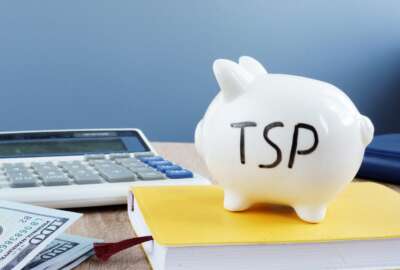Hubbard Radio Washington DC, LLC. All rights reserved. This website is not intended for users located within the European Economic Area.
The TSP doesn’t stand still, as one critical new feature debuts in 2024
The I Fund, that is the international stock fund operated by the Thrift Savings Plan. Next year, the Federal Retirement Thrift Investment Board will overhaul ho...
The I Fund, that is the international stock fund operated by the Thrift Savings Plan. Next year, the Federal Retirement Thrift Investment Board will overhaul how the I Fund goes about making investments. For what this means and why it’s important, the Federal Drive with Tom Temin talked with Certified Financial Planner Arthur Stein.
Interview Transcript:
Tom Temin And you have studied this pretty closely and there’s a new index associated with it. Can we begin by just explaining what an index is in this context and how it works generally?
Art Stein Yeah, an index is produced by an outside company and they make decisions about what investments should be included in their index and in what proportions, what percentage amounts should go into each stock. And they then license that index to various people. So the I fund has been using an index that is very common. It’s called the [Morgan Stanley Capital International, Europe, Australasia and the Far East (MSCI EAFE)] Index and it’s a very commonly used index and it only invests in developed countries, and only certain developed countries and only in very large companies.
Tom Temin And we should point out that stands for Morgan Stanley, Capital International, Europe, Australasia and the Far East.
Art Stein Exactly. And now they’re in an index with an even more complicated name. Now they’re going to an index. That change will take place in 2024, called once again MSCI. Same company produced it. ACWI IMI ex USA ex China ex Hong Kong Index. And so here’s what that means. It’s a much broader based index. It’s going to invest in twice as many countries in stocks from twice as many countries. It’s going to invest in seven times as many stocks. So much larger percentage of foreign stocks that are out there. And it’s going to exclude stocks of companies from China and Hong Kong because this became a political issue.
Art Stein A lot of Congress people did not want TSP investing in China, and that includes now Hong Kong.
Tom Temin So it’s going from 21 countries in which stocks exist that this index can invest in to 44. So that is a major expansion.
Art Stein Major expansion. And all the extra countries, well, they added Canada finally, I don’t know why they ever excluded Canada, but then they added 23, what they call emerging market countries. This is like countries in Latin America and Thailand and various other places, so much more broader based. And I think that’s a good thing. What struck me is that the rate of return based upon the figures provided by the FRTIB, the Federal Retirement Thrift Investment Board, not a big difference in performance. And of course, performance has been a big complaint with the I fund for a long time. So I took the figures and tried to summarize them, did summarize them in a couple of ways. One, the average annual rate of return over the last 20 years, according to the FRTIB figures, would have been 9.3% for the new index, compared to 8.4% for the old index. And to give it perspective, I then did an example. Again, it’s in my blog. Suppose you had 100,000 in each of the indexes 20 years ago, and what would they be today? And with the new index it would be worth 437,000. With the current index would be 394,000. So that’s an advantage, but it’s only a 13% difference over a 20 year period. So really not a big difference in the performance.
Tom Temin So essentially they’re getting a tweak here. And just let me ask you one technical question, and this is my own ignorance about this. If you subscribed to that index, the new one that they’re about to use, does that index prescribe the percentage of each of the 5,621 stocks in that index? And if that’s the case, then every fund that subscribes to that index will have identical performance or how does that work?
Art Stein Yes, every fund that invests in that index would have identical performance, because part of the index is not only specifying which stocks, but which percentage and in each stock. So the same thing is true of the current index, the EAFE index. Its performance is going to be identical with the performance of any other mutual fund or exchange traded fund that uses the same index. It might be small differences because of expenses, but basically they’re going to have the same performance. And of course the C Fund and the fund in the F fund are all index funds too. And the same thing is true. Those funds use indexes that are readily available in funds outside the TSP, and the performance is basically the same.
Tom Temin Does that mean then, the skill of the managers in this case, the Federal Retirement Thrift Investment Board, is in picking the index, not in picking the mix of stocks that the fund represents?
Art Stein Exactly. That’s a perfect way to put it. They get to pick the index. Now it happens that they picked an index six years ago and they were ready to institute it. And I think 2020, it was going to go into effect. And that’s when members of Congress said, wait a second, this includes China. We don’t want that. Now, I’m not in favor of political interference, but it happened to be like sometimes it’s more important to be lucky than good. It was good that they did that because stocks and China have not done well over some period of time. What I think happened is then they turned to MSCI, the company that creates these indexes. So we want basically the same index only without China and Hong Kong. So they produced this index. As far as I can tell, it is not available outside the TSP at this point. I would not be at all surprised of that change because there are other people who don’t want to get involved with China and Hong Kong for a variety of reasons.
Tom Temin Well, if you look what’s been going on with the ant group, and some of the big public trials going on right now of Chinese, I guess their equivalent of oligarchs. Anything can happen. China is volatile and things bubble up and then they collapse totally often because you fall out of favor with the party.
Art Stein Where you have that problem. And just the fact that the economy in general is not doing well and their stock market is not doing well. Part of it is political interference and part of it is economic competition with the United States. And we’ve acted in ways that is for Chinese stocks, which I suppose is one of the goals. But excluding politics, it is what it is. I think there’s no reason to worry about the new index. I think it’s fine. The TSP is chosen to get an index from one of the major index providers. It shouldn’t be a problem to manage. And I don’t think people should worry about not being able to invest in Chinese stocks.
Tom Temin Yeah, well if you buy a Volvo, for example, a great Swedish car, it’s actually the parent company is Chinese and there’s a lot of major brands in the United States that if you trace it back, there’s Chinese ultimate ownership, very complicated.
Art Stein Lenovo, which makes computers that lots of people like and buy.
Tom Temin Yeah. So it’s pretty hard to escape China in daily life. Pretty much everything from what you wear, drive, eat and consume. Otherwise, there’s a connection to China. And just looking ahead to 2024, generally, the stocks in the United States, the Dow Jones Industrial Index, is at record highs. I don’t think anyone would have predicted that six or nine months ago. What’s your general feeling on how people again, not investment advice, but how should they think about what they do in the coming year with respect to TSP?
Art Stein Let’s say that this year through the end of last month, stocks have done great. The C funds up 21%, S fund 13%, the I fund is up 12%. It’s been a great year for stocks. The bond fund, the F fund is up a little bit, which is better than it has been doing. And the G Fund has been up 3.8% this year because interest rates got so high. So it’s been a great year, and it’s certainly rewarded people who stayed invested in 2022, which was a terrible year for stocks and bonds. And as a result, just a really bad year for investors because there aren’t many years where you have double digit declines in both stocks and bonds. But we saw that last year. So people didn’t bail out, really did themselves a favor. As far as next year, I would never forecast. It does appear that the Fed is not going to raise interest rates any more. In fact, they’ve indicated that they’re going to lower interest rates a little bit during the year. That should be very positive for bonds and stocks. But we don’t know what’s going to happen. I mean, and just look at 2020 started out as a very good year for about six weeks and then we got hit with COVID or there could be a war, there could be a natural disaster or who knows what is going to happen. But what I look at is long term stocks outperform bonds and bank accounts by significant amounts. And so for long term investors, I mean, I think that we say past performance, no guarantee of future performance, but there’s a pretty strong record for why people invest in stocks. And you speak of, I know that you have reported a lot on TSP millionaires. And when you look at what they are invested in, it’s mainly the C and the S funds. And they stuck with it. People who mainly invested in the F and G funds, they didn’t become TSP millionaires.
Tom Temin Right. Or else they did if they worked for 50 years.
Art Stein If you put in 900,000, you might have a million or whatever the figure would be. But they didn’t become TSP millionaires. It’s the people. I just heard from somebody last week and talking to them about doing a retirement plan. And they mainly invested in the G Fund, and they, after many, many decades, have about 500,000. It just doesn’t do that well.
Tom Temin And I guess to be careful of the shiny object, I’m just reading a story in the Wall Street Journal about the electric car startups. So Tesla has been an interesting investment, maybe. That looks like that company will last, but three electric car start ups and they all had billions in market capitalization. Briefly, Electric Mile Last Solutions, Proterra, Lordstown Motors have all filed for bankruptcy, and there’s a couple of others which are scraping by to get enough cash to be able to build the cars people ordered. So sometimes shiny things that are huge in potential also you would want to avoid is too risky on the upside.
Art Stein Well, that’s just an example of the difficulty of picking out individual stocks, because somebody is going to do really well with electric cars. And Tesla has done well, but not well enough, I think, to justify their stock price at the moment. But you don’t know. And frequently all these small companies who pile into something like electric vehicles, which becomes very popular, suddenly lots of them are going to fail. I mean, that’s just the nature of investing. Elon Musk has done a tremendous job of building up the company. Now, the question is, is he going to do a tremendous job of maintaining whatever performance they have? And that’s an issue.
Copyright © 2024 Federal News Network. All rights reserved. This website is not intended for users located within the European Economic Area.
Tom Temin
Tom Temin is host of the Federal Drive and has been providing insight on federal technology and management issues for more than 30 years.
Follow @tteminWFED
Related Stories
Related Topics





